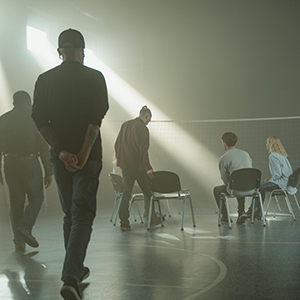Attachment insecurity predicts outcomes in an ACT-CBT group therapy for adults in a physical rehabilitation centre

Accepted: August 23, 2022
Appendix: 130
HTML: 34
All claims expressed in this article are solely those of the authors and do not necessarily represent those of their affiliated organizations, or those of the publisher, the editors and the reviewers. Any product that may be evaluated in this article or claim that may be made by its manufacturer is not guaranteed or endorsed by the publisher.
Authors
Adapting to chronic illness or disability is accompanied by acute and ongoing illness stressors. Psychological factors such as emotional distress and low self-efficacy are common experiences in chronic illness and disability and interfere with adaptation and psychosocial outcomes such as health-related quality of life. Transdiagnostic group psychotherapy may provide a parsimonious approach to psychological treatment in rehabilitation care by targeting shared illness stressors across mixed chronic illnesses and disabilities, and shared processes that maintain psychological symptoms. Attachment theory may explain individual differences in outcomes and help identify individuals at risk of poor health-related quality of life trajectories. Adults (N=109) participated in an 8-week process-based ACT-CBT psychotherapy group at a tertiary care physical rehabilitation centre between 2016 and 2020. Participants completed measures of emotional distress, self-efficacy, health-related quality of life, and attachment at pre- and post-treatment. Multilevel analyses indicated that patients improved on most outcomes at post-treatment. Attachment anxiety at pre-treatment was associated with more positive outcomes. Reliable change indices suggest clinically meaningful change for the majority of participants, but most were not recovered. Results provide proof-of-concept for the transdiagnostic group intervention and suggest that a longer course of treatment may be clinically indicated. Results warrant replication with larger and more diverse samples, and more robust designs.
How to Cite

This work is licensed under a Creative Commons Attribution-NonCommercial 4.0 International License.
PAGEPress has chosen to apply the Creative Commons Attribution NonCommercial 4.0 International License (CC BY-NC 4.0) to all manuscripts to be published.
Similar Articles
- Zelda Gillian Knight, Psychotherapy with two late adulthood children of the colonies , Research in Psychotherapy: Psychopathology, Process and Outcome: Vol. 20 No. 3 (2017)
- Samantha Reis, Emily L. Matthews, Brin F.S. Grenyer, Characteristics of effective online interventions: implications for adolescents with personality disorder during a global pandemic , Research in Psychotherapy: Psychopathology, Process and Outcome: Vol. 23 No. 3 (2020)
- Salvatore Gullo, Gianluca Lo Coco, Carla Di Fratello, Francesca Giannone, Giuseppe Mannino, Gary Burlingame, Group climate, cohesion and curative climate. A study on the common factors in group process and their relation with members attachment dimensions , Research in Psychotherapy: Psychopathology, Process and Outcome: Vol. 18 No. 1 (2015)
- Eunice Barbosa, Maria Amendoeira, Tiago Ferreira, Ana Sofia Teixeira, José Pinto-Gouveia, Joào Salgado, Immersion and distancing across the therapeutic process: relationship to symptoms and emotional arousal , Research in Psychotherapy: Psychopathology, Process and Outcome: Vol. 20 No. 2 (2017)
- Marianna Liotti, Alice Fiorini Bincoletto, Fabiola Bizzi, Marta Tironi, Simone Charpentier Mora, Donatella Cavanna, Guido Giovanardi, Elliot Jurist, Anna Maria Speranza, Vittorio Lingiardi, Annalisa Tanzilli, The catcher in the mind: validation of the brief-mentalized affectivity scale for adolescents in the Italian population , Research in Psychotherapy: Psychopathology, Process and Outcome: Vol. 26 No. 3 (2023)
- Bruno Faustino, António Branco Vasco, João Delgado, António Farinha-Fernandes, José Carlos Guerreiro, Exploring the impacts of COVID-19 related social distancing on loneliness, psychological needs and symptomatology , Research in Psychotherapy: Psychopathology, Process and Outcome: Vol. 23 No. 3 (2020)
- Mahbobe Ghavidel Heydari, Mahmoud Shirazi, Gholam Reza Sanagouyemoharer, The effect of positive psychotherapy in test anxiety among Zahedan students with hemophilia , Research in Psychotherapy: Psychopathology, Process and Outcome: Vol. 21 No. 1 (2018)
- Emanuela Saita, Martina Tramontano, Navigating the complexity of the therapeutic and clinical use of photography in psychosocial settings: a review of the literature , Research in Psychotherapy: Psychopathology, Process and Outcome: Vol. 21 No. 1 (2018)
- Fabienne Gutjahr, Cord Benecke, Crying in psychotherapy: an exploratory mixed-methods study on forms of emotional crying and associated therapeutic interventions , Research in Psychotherapy: Psychopathology, Process and Outcome: Vol. 27 No. 1 (2024)
- Sarah Abraham, Elisabeth Edginton, David Cottrell, Sandy Tubeuf, Measuring health-related quality of life measures in children: lessons from a pilot study , Research in Psychotherapy: Psychopathology, Process and Outcome: Vol. 25 No. 1 (2022)
<< < 1 2 3 4 5 6 7 8 9 10 > >>
You may also start an advanced similarity search for this article.

 https://doi.org/10.4081/ripppo.2022.634
https://doi.org/10.4081/ripppo.2022.634




